The incarnation is grounded in intentionality. Think about it. God chooses to be revealed not as a conquering king, an aggressive tyrant, or even a political or social leader. Rather, God chooses the supremely vulnerable and utterly humble form of a newborn child. More so, this child is born into what many describe as total poverty and a place of origin where there is no expectation of anything good or memorable. Nathanael even asks at the beginning of the Gospel of John, “Can anything good come out of Nazareth?” (1:46).
As significant as this is, the reality of the incarnation goes beyond its historical and cultural context. While it is important to recognize the temporal elements of this act of self-gift, an even greater reality exists on which the entire essence of our Christian identity stands: God becomes one of us. Through the incarnation—through God becoming human—humans are invited to intimately share in God’s divinity. The intentionality of this act of God’s humility, even vulnerability, permeates our lives throughout the Christmas season and beyond.
But so often we are quick to snuff out the Christmas candle. By the end of Christmas Day, the celebrations are over, and we turn our attention back to the realities of work, school, and life. It was a great day, maybe even a great couple of days if we started celebrating on Christmas Eve. But, for all intents and purposes, Christmas ends when the radio station switches from holiday tunes back to ’80s soft rock classics.
If we live liturgically, however, Christmas Day is just the beginning of an entire season dedicated to the reality of the incarnation, God with and among us. This is, of course, always the case regardless of the liturgical season, but the 12 days of Christmas—the days between Christmas Day and Epiphany—hold this reality with primacy. Perhaps we can channel the same intentionality of the incarnation in our own lives by living with particular intentionality during the Christmas season. The daily gospels from these days invite us to this intentional self-reflection.
Christmas Day (December 25, 2021)
Luke 2:1–14
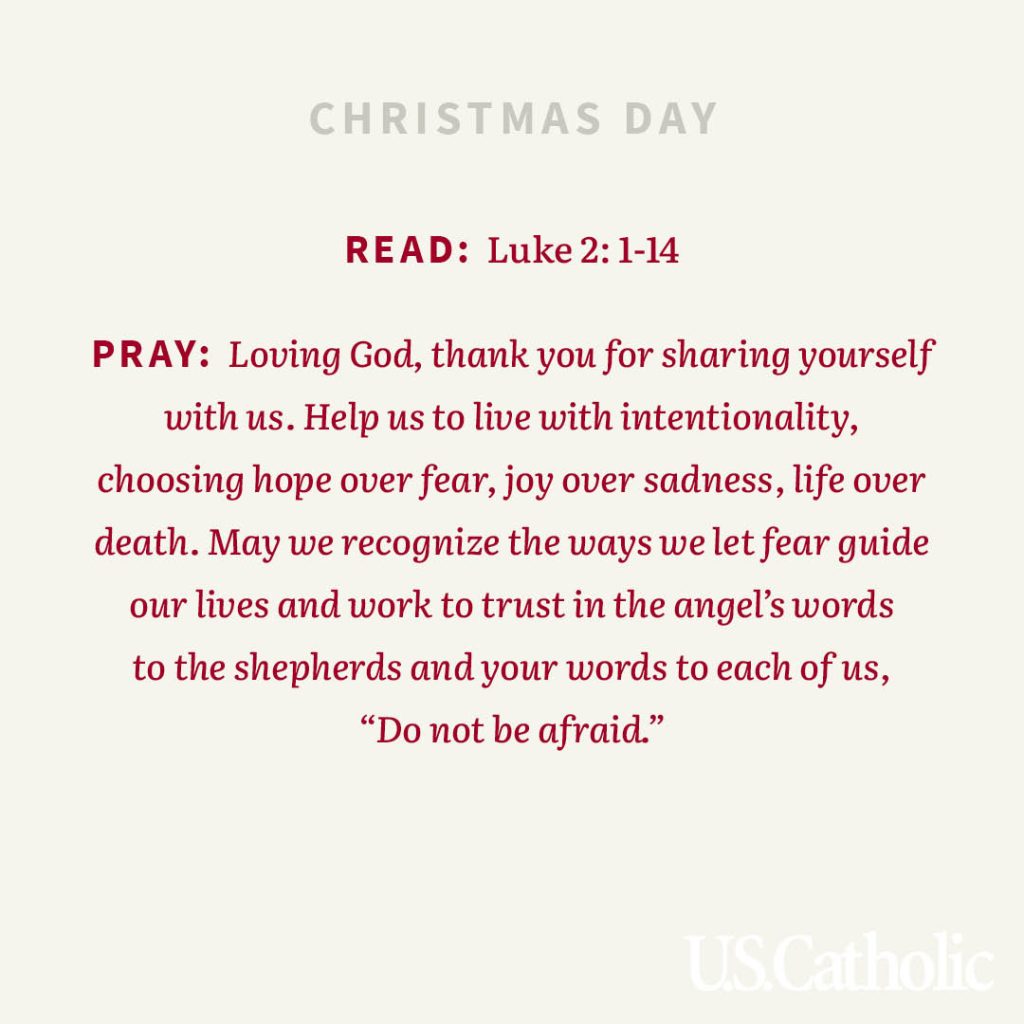
The evangelist Luke is an expert at upholding people who are poor or marginalized. (Consider the gospel stories we only encounter in Luke: the rich man and Lazarus, the Prodigal Son, and the Good Samaritan, among others.) We see this perhaps most directly in Luke’s infancy narrative where common shepherds, a nomadic people known for their lack of stability and social status, are the first to hear the good news of God’s love incarnate. The angel’s words to the shepherds are particularly poignant: “Do not be afraid; for see—I am bringing you good news of great joy for all the people” (2:10). We can imagine the angel saying the same thing to us on Christmas Day: “Do not be afraid.”
What are some fears in our own lives that prevent us from being who and whose we are called to be? When have we made decisions out of fear instead of hope? When have we hidden our true selves for fear of rejection or hurt? When have our thoughts, beliefs, or actions forced others to live in fear?
Act: Any understanding of the incarnation without the reality of time and space is impossible, for the incarnate God lives, works, and breathes in the very essence of our humanity. It can be easy to take this reality for granted, however, especially during the hustle and bustle of the Christmas season. Take some time to create a family Christmas time capsule. Each family member can take an item (or a representation of something) that is especially significant to them at this moment in time and place it in a small box. Seal the box, write Christmas 2021 on the top or side, and place it in a cabinet or closet. Revisit the capsule every few years and reflect on the past and present reality of God sharing Godself with us.
Feast of the Holy Family of Jesus, Mary, and Joseph (December 26, 2021)
Luke 2:41–52
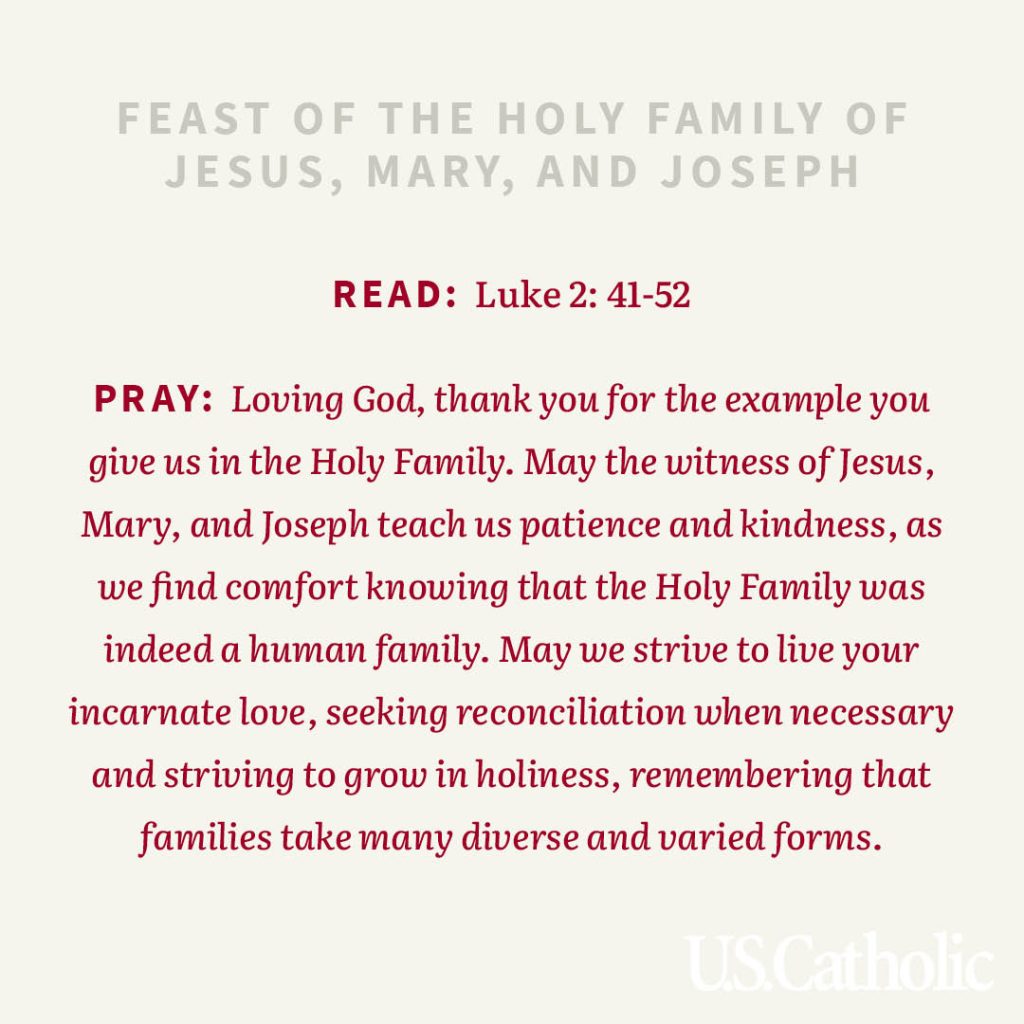
Imagine the horror and fear that Mary and Joseph must feel when they realize Jesus is missing. Not only are they a long way from home and traveling with a large group (which can be stressful enough!), Mary and Joseph must experience a host of different emotions—concern, distrust, and even anger. Now imagine how Mary must feel when Jesus replies to her simple question with a sassy response. Mary asks, “Child, why have you treated us like this? Look, your father and I have been searching for you in great anxiety” (2:48). Seemingly frustrated by the situation, I imagine that Mary does not necessarily appreciate the response to her question: “Why were you searching for me?” (2:49). I know that would not have gone over well if I had said those words to my mom!
When do we allow our words to sow division instead of unity, fear instead of peace? When have we treated family members with cynicism and hurtful sarcasm instead of affirmation and support? When have we allowed our emotions and feelings of anger or fear to shape the way we interact with others? When have we acted selfishly, putting our own needs over the needs of those we love? When have our own images and expectations of family been unhelpful or unhealthy?
Act: During the Christmas season we often remember family members and friends who have died. We also remember that those who rest in the peace of Christ join the great cloud of witnesses, the men and women of faith who have gone before us. The feast of the Holy Family is a great day to create a witness wreath. Take one of your existing Christmas wreaths and place small reminders of beloved family members around the branches. These items can be anything from a brooch to a baseball card to a stick of gum. You may even use photographs if you wish. These physical signs and symbols call to mind our ancestors in family and faith. Place the wreath somewhere visible in your home. Perhaps even use it as a centerpiece for prayer. This is also a way to repurpose your Advent wreath by simply replacing the purple and pink candles with white ones and adding your witness mementos.
Feast of St. John, Apostle and Evangelist (December 27, 2021)
John 20:1a, 2–8
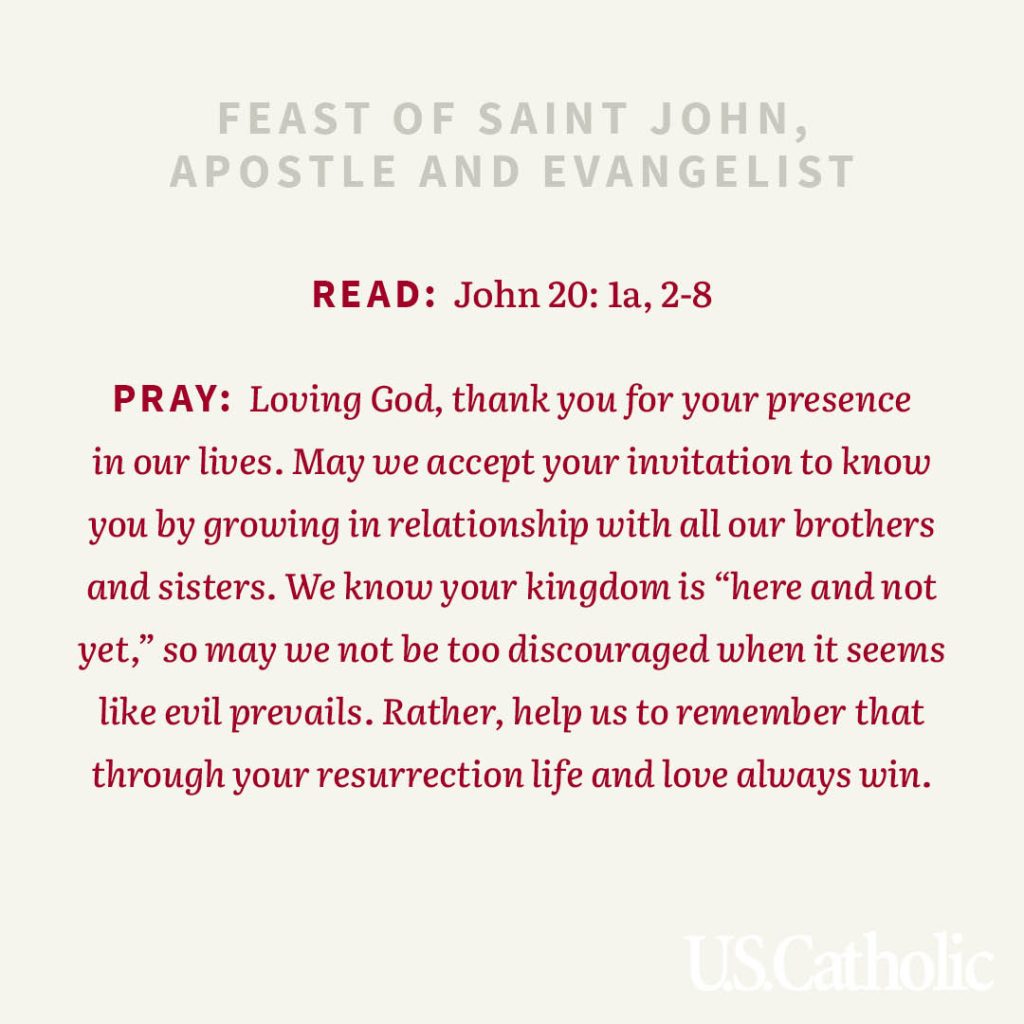
The resurrection narrative in today’s gospel might initially seem misplaced amid the recent accounts of Jesus’ birth. In fact, this is the gospel reading we proclaim on Easter Sunday. If we are willing to think in terms of kairos (God’s time/qualitative) instead of chronos (sequential time/quantitative), we realize that the death and resurrection of Jesus are intimately bound up in the incarnation. In fact, the entire paschal mystery—Christ’s life, death, and resurrection—is possible because God became human. In today’s gospel the beloved disciple “saw and believed” (20:8). Amid the suffering and death that seem so commonplace in our world today, we might question the notion of belief, asking ourselves, “Why would an all-powerful God allow evil to exist and perpetuate?” But the Christmas season reminds us that this same God is one of humility, lowering Godself to be one with us. Through our participation in God, however, we have the ability and responsibility to alleviate pain, tend to suffering, and carry the burdens of others. God’s kingdom is both here and not yet here. Because of the incarnation, God is intimately present on Earth, but we also look forward to the day when the reign of God on Earth will be as in heaven.
When do we find it difficult to see and believe? When have we refused to acknowledge our own pain or the pain of others? When could we have done something intentional to help bring about God’s kingdom on Earth but did not? When have we chosen to hurt instead of heal?
Feast of the Holy Innocents (December 28, 2021)
Matthew 2:13–18
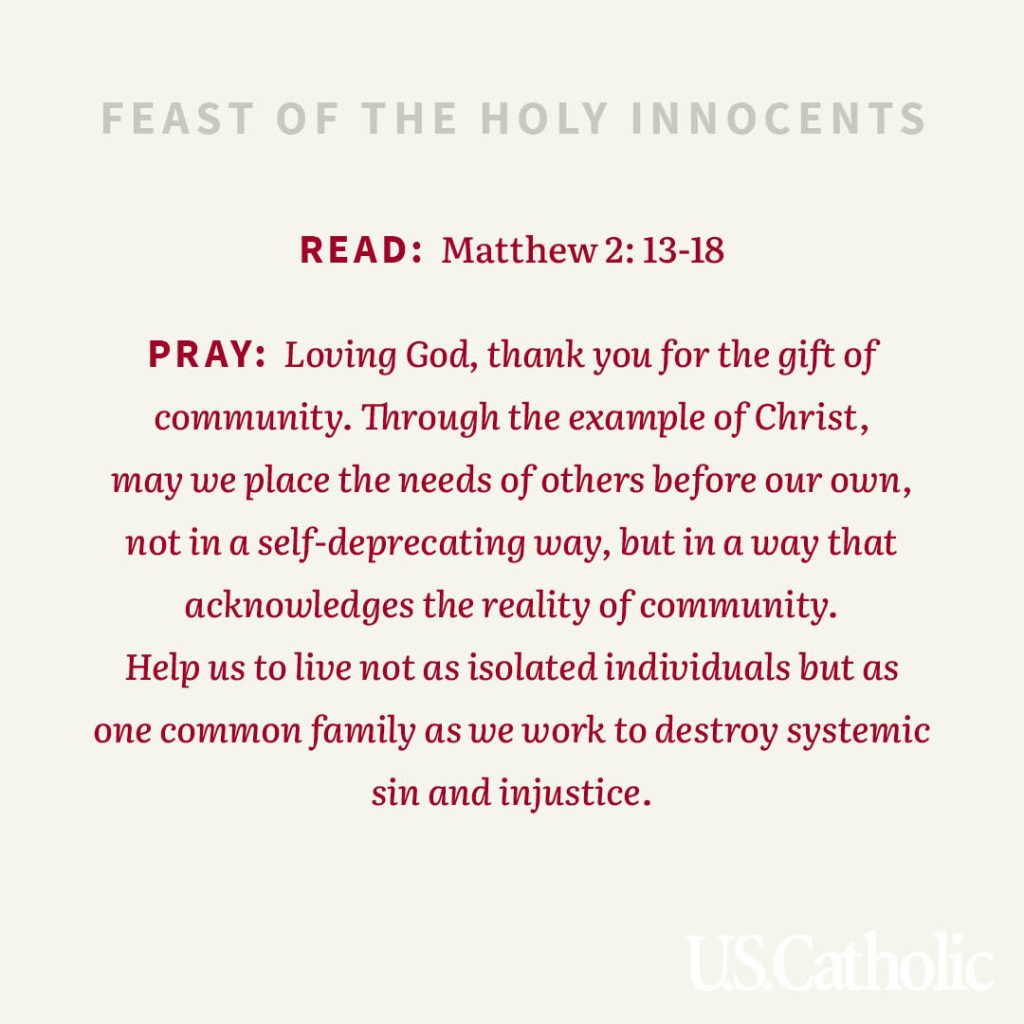
Today’s gospel is disturbing. Actually, “disturbing” is quite the understatement. Feeling threatened by an infant, Herod orders the massacre of all young boys in Bethlehem and beyond. Why? He is so desperate to cling to power that he is willing to kill. I wish we could say this is only a historical event, but that is not the case. We see killing for power when Black men and women are murdered by city officials. We see killing for power when people weaponize vaccines and masks, shouting self-importance disguised as freedom. We see killing for power when politicians and corporate leaders continue to destroy the environment for the sake of profit. We see killing for power in unjust wars that continue for years, destroying the lives of innocent people. Abuse of power is so commonplace in our country and world that we literally live in systems of oppression so commonplace that oppressors are often not even aware.
When do we cling to power, even at the sake of hurting someone else? When has pride prohibited us from working for the common good? When do our own wants take precedence over the needs of others? When have we acted selfishly?
Act: On this feast of the Holy Innocents we remember that there are still systems of injustice so commonplace in our church and world that we are often not even aware of them. Let today be an opportunity to work for justice, even in small ways. Write a family letter to your local senator or congressperson letting them know you value life from conception until natural death. Advocate for the poor and powerless, support education reform, seek out ways to offer shelter and security to immigrants and refugees, provide resources for LGBTQ youth, or share vaccine education. All of these are life issues.
The Fifth Day in the Octave of Christmas (December 29, 2021)
Luke 2:22–35
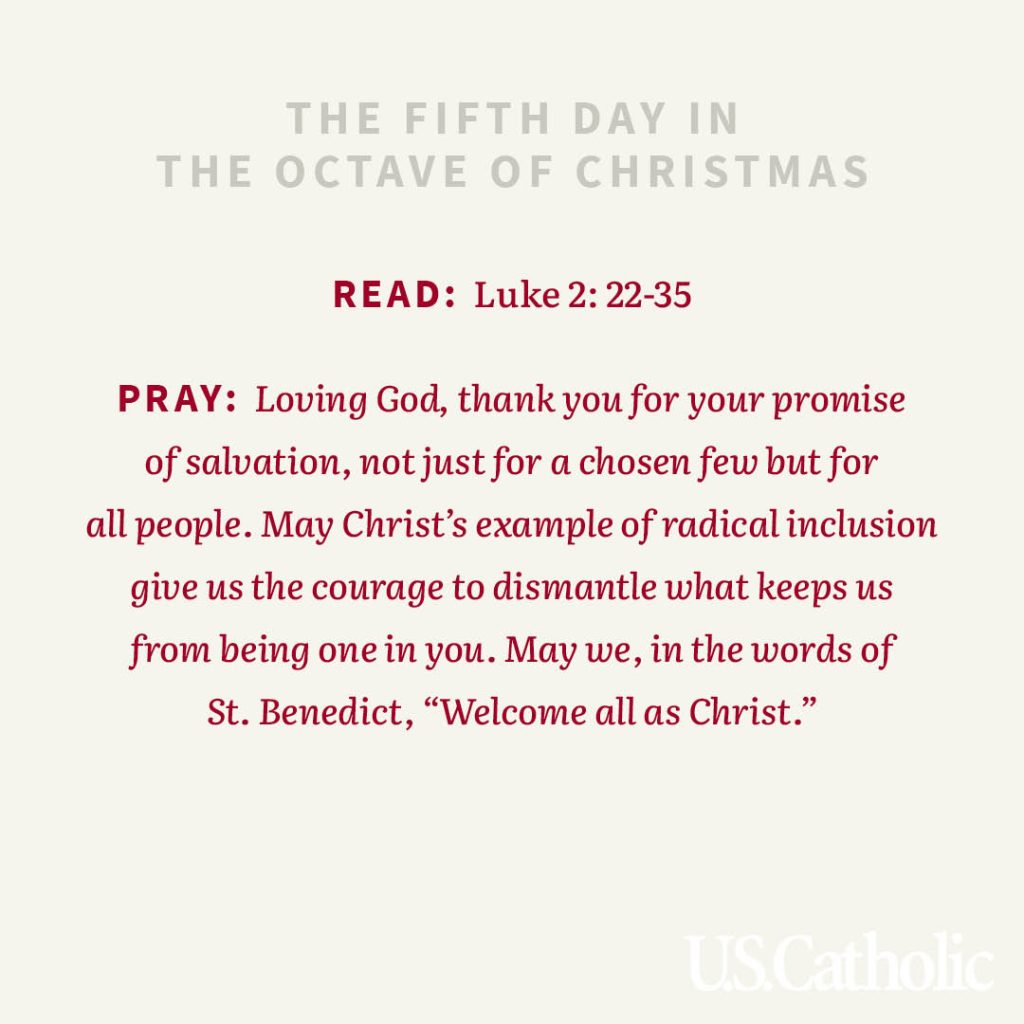
One of my all-time favorite prayers is the Canticle of Simeon, which comes from today’s gospel. When Jesus is brought to the temple in accordance with the law, Simeon proclaims, “Master, now you are dismissing your servant in peace, according to your word; for my eyes have seen your salvation, which you have prepared in the presence of all peoples, a light for revelation to the Gentiles and for glory to your people Israel” (2:29–32). Simeon’s words remind us that God’s plan of salvation is for all people. Even so, especially within the church, we are quick to create the “other.” She believes something different than I do: She is other. He prays in a way that I don’t understand or agree with: He is other. We create divisions and distinctions that are clearly not of God as we perpetuate assumptions and stereotypes.
When do we cultivate division and disunity? When have we intentionally excluded others? When have we perpetuated hurtful stereotypes and divisions? When have we dismissed the way others pray, live, and love?
Act: The Canticle of Simeon, which we hear in today’s gospel, is prayed during compline, the night prayer of the church. Try to incorporate compline into your family’s nightly routine. A quick Google search will provide an order of service with all the prayer texts you need. There are even phone apps for this very purpose. Even simply praying the Canticle of Simeon together is a wonderful way to end the day!
The Sixth Day in the Octave of Christmas (December 30, 2021)
Luke 2:36–40
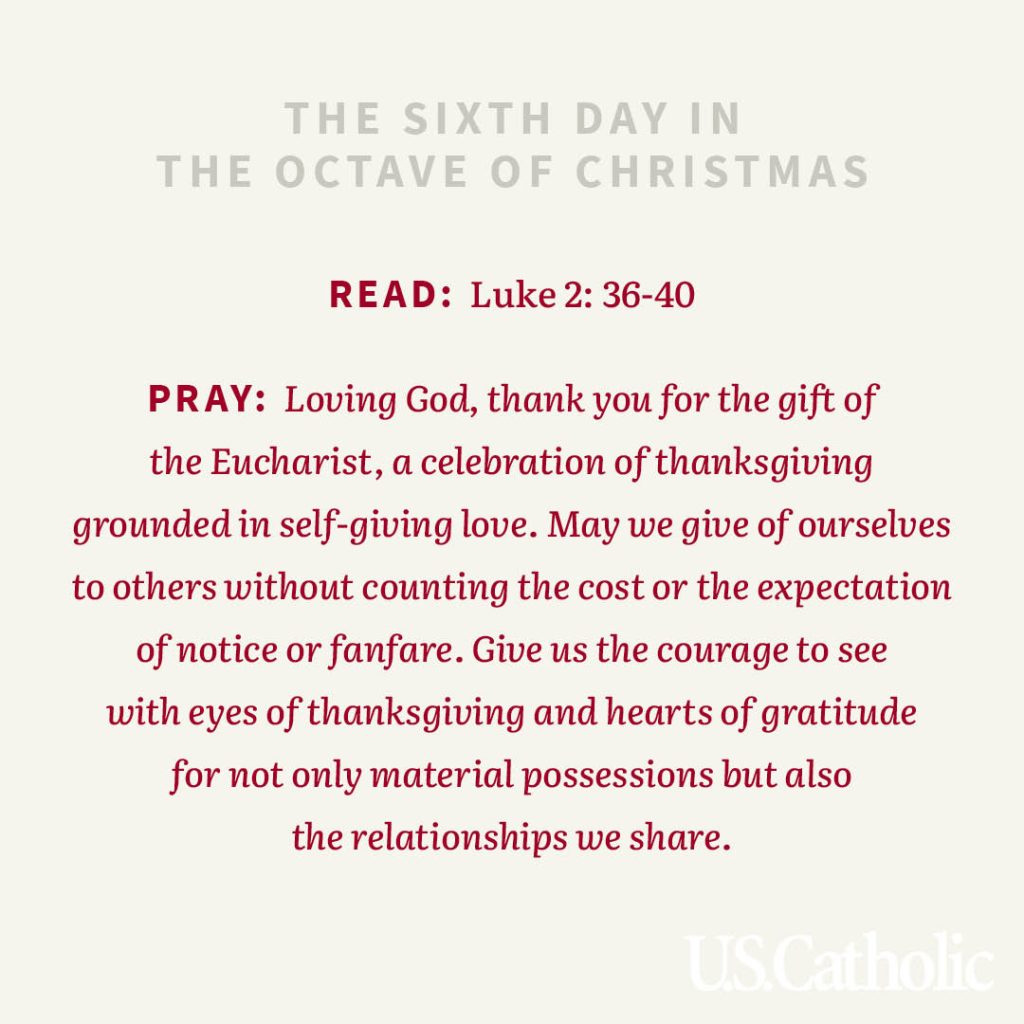
Like Simeon yesterday, Anna also spends her days in the temple waiting for the promise of God to be fulfilled. Today we hear that she “began to praise God and to speak about the child to all who were looking for the redemption of Jerusalem” (2:38). Anna’s act of gratitude can serve as a good checkpoint for each of us as we continue our journey through the Christmas season. While we almost certainly share words of gratitude and thanks for gifts we receive or hospitality we are shown, thanksgiving cannot be limited to a single moment or event. Instead, authentic thanksgiving and gratitude is a way of life. German theologian Meister Eckhart notes, “If the only prayer you ever say in your entire life is thank you, it will be enough.” So often our daily prayers are clouded with our lists of needs and petitions, all of which are good and holy. But we must also take time, like Anna, to thank the God who gives us life. If we are intentional about practicing gratitude and thanking God for the gifts God gives us, we will transform into who we are called to be: Christ for others. The word eucharist, which comes from the Greek eucharistia, literally means thanksgiving. If, as we profess, our lives are grounded in the Eucharist, we must admit that means living eucharistically with gratitude.
When do we typically forget to practice thanksgiving? What prevents us from showing gratitude to ourselves, others, and God? When have we griped and complained about a coworker, friend, or family member? When were we so gripped in self-affirmation that we forgot all those who helped us along the way?
The Seventh Day in the Octave of Christmas (December 31, 2021)
John 1:1–18
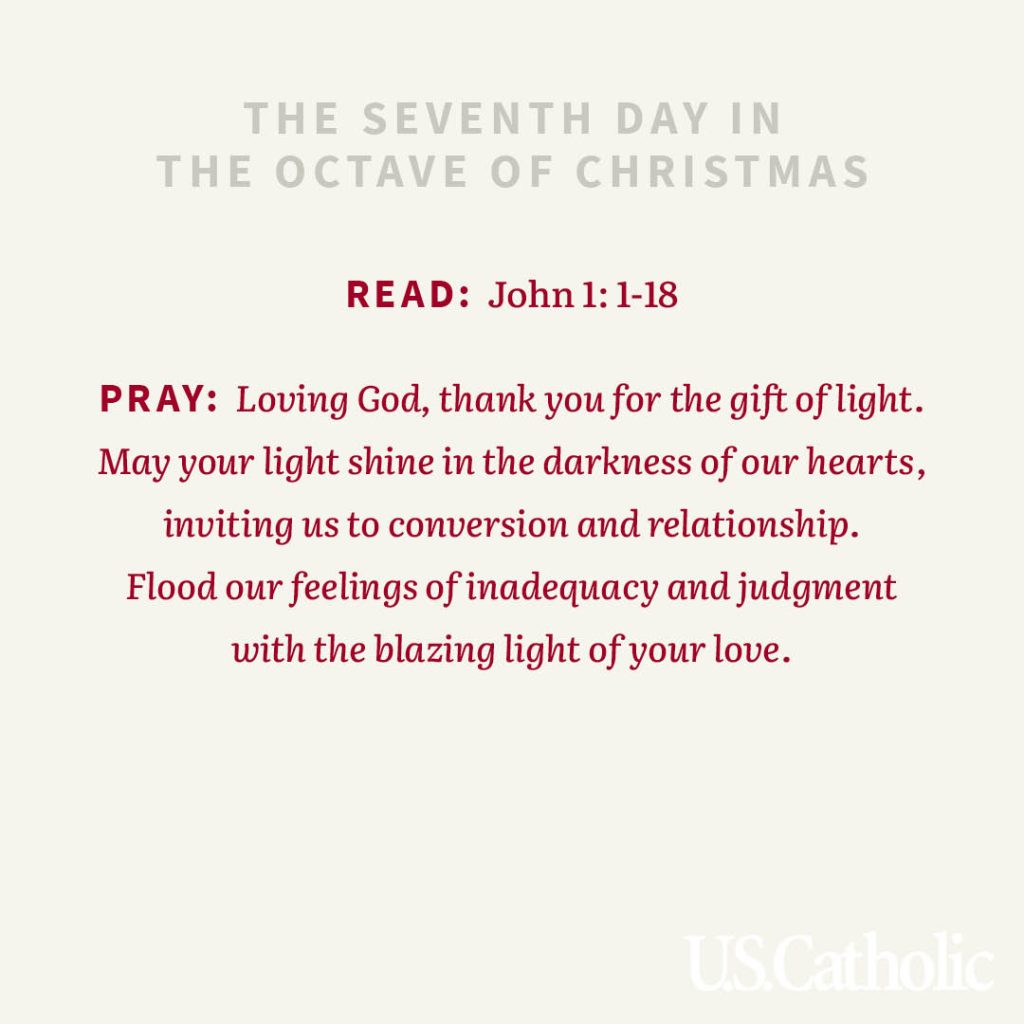
Today we hear the beautiful hymnic prologue from the Gospel of John. Even amid the Christmas season, for those of us in the Northern Hemisphere the days are often still bemoaningly gray and dreary. Fortunately, John tells us he “came as a witness to testify to the light” (1:7), noting the “true light, which enlightens everyone, was coming into the world” (1:9). As we encounter the lights of the Christmas season on our trees and houses, do we remember the Light of the World coming to us amid the darkness of our lives? Or is our fixation on exterior illumination fueled by competition and pride, à la Clark Griswold? I am not suggesting one approach is right and the other wrong, but perhaps the sights and lights of the season are an opportunity to center ourselves in Christ.
When do we place things, commitments, and people ahead of God? When have we reverenced power, prestige, and wealth? What do we value? What do we do with our time, talents, and treasure?
Solemnity of the Blessed Virgin Mary, the Mother of God (January 1, 2022)
Luke 2:16–21
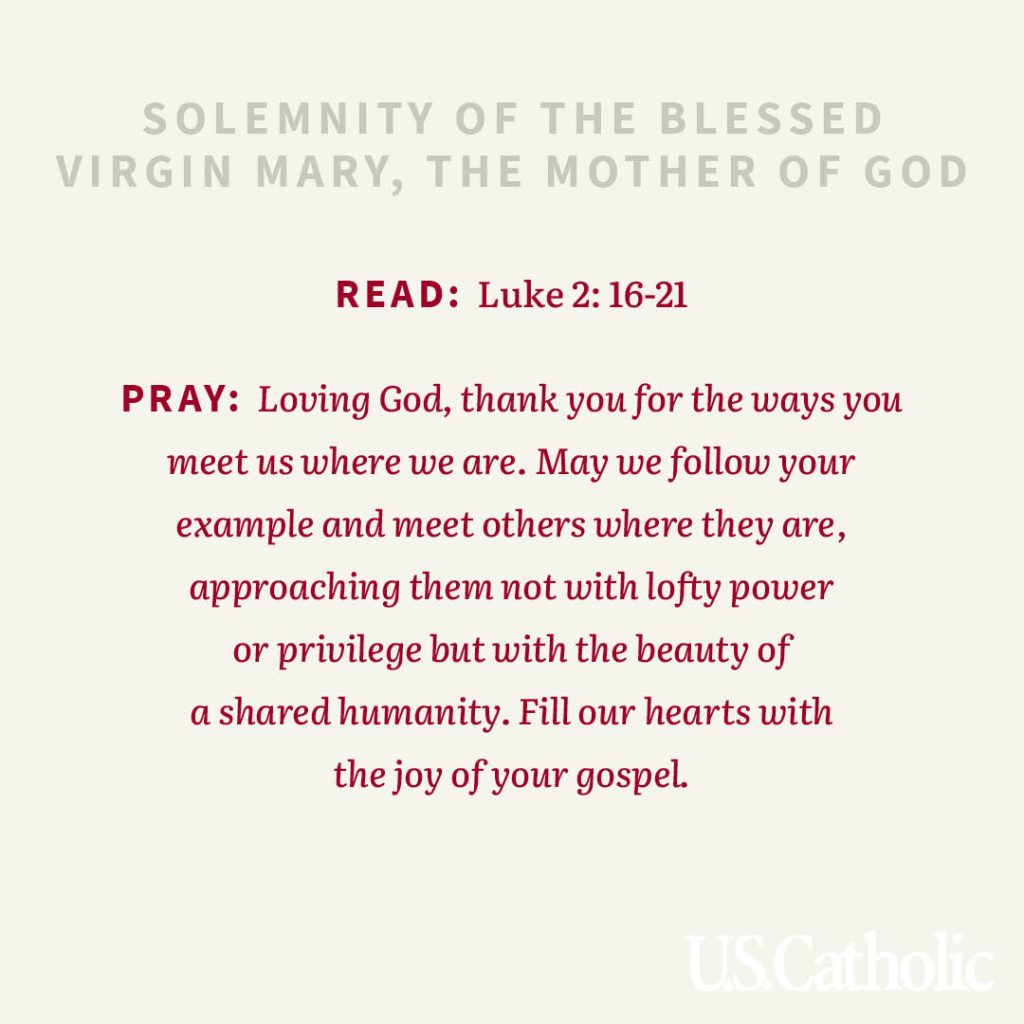
The shepherds travel in haste to Bethlehem to see what has been foretold to them. After encountering Jesus, they go forth in amazement to share the message of good news. Just like the shepherds, our encounter with Christ should send us in joy and haste to share Christ with others. We must remember, however, that encounter is about listening and being present. It is about standing in solidarity and withholding judgment. It is about relationship and authenticity. A hallmark of his papacy and pastoral mission, Pope Francis recently said, “The continued global health crisis has painfully highlighted the urgent need to promote a culture of encounter for the whole human family, and for all men and women to be ‘passionate about meeting others, seeking points of contact, [and] building bridges.’ ”
When do we use others, objectifying them for a purpose or reason, then abandon them? When have we nurtured transactional relationships instead of relationships based in authentic encounter? When have we refused to build bridges? When have we shared our faith with condemnation instead of joy?
The Epiphany of the Lord (January 2, 2022)
Matthew 2:1–12
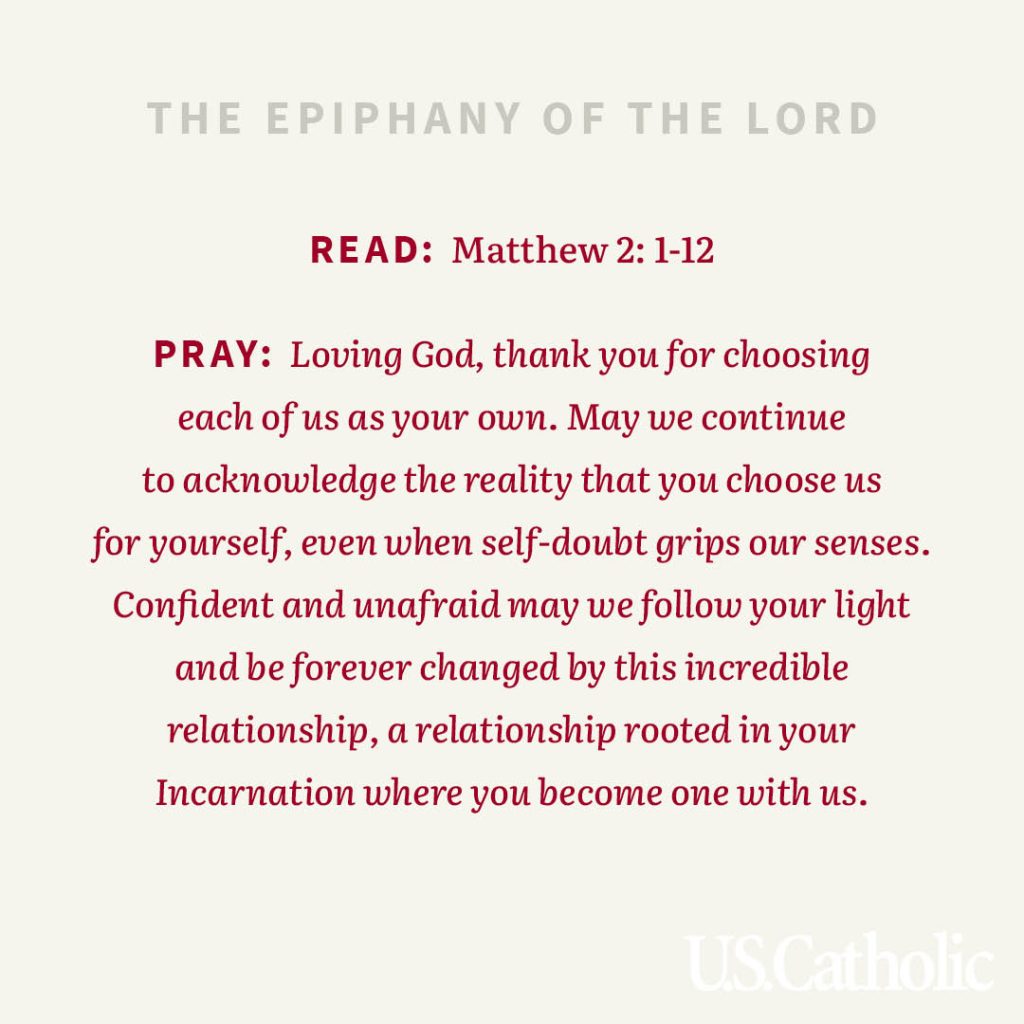
It is interesting to note that Epiphany in the early church was not centered on kings and gifts but on the baptism of Jesus. Even so, today’s association with light and new life in Christ is not negligible. In the account of Jesus’ baptism in the Gospel of Matthew, the heavens open and we hear a voice saying, “This is my Son, the Beloved, with whom I am well pleased” (3:17). God says the same to each of us in the sacrament of baptism: “You are my beloved; with you I am well pleased.” Our relationship with God parallels the search of the magi in today’s gospel. The magi search for a reality that ultimately claims each of them, changing the course of their direction and dreams. Similarly, as God claims us for Godself, we have no choice but to live differently. This is a challenge to be sure, but the light and love of Christ revealed in the incarnation show us that it is possible and necessary. Are we willing to accept this prophetic invitation?
When do we reject God’s invitation to relationship? When have we denied our own belovedness? When have we not treated others as God’s beloved? When have we chosen abrasive darkness instead of the subtle light?
Act: Many Christians celebrate Epiphany by “chalking” their door lintels, the space typically above a door in the home. Using blessed chalk, which is often available from your parish, mark the symbols 20 + C + M + B + 22 above your door. This includes the year (2022) and the traditional names of the three magi from the Gospel of Matthew: Caspar, Melchior, and Balthazar. The letters CMB also are an abbreviation for the Latin blessing Christus mansionem benedicat—“May Christ bless this house.” At the start of a new year, this is a wonderful family prayer opportunity that recognizes the importance of the home as a central place of prayer and a sacred space for God.
This article also appears in the December 2021 issue of U.S. Catholic (Vol. 86, No. 12, pages 10-14). Click here to subscribe to the magazine.
Image: Unsplash/Enging Akyurt


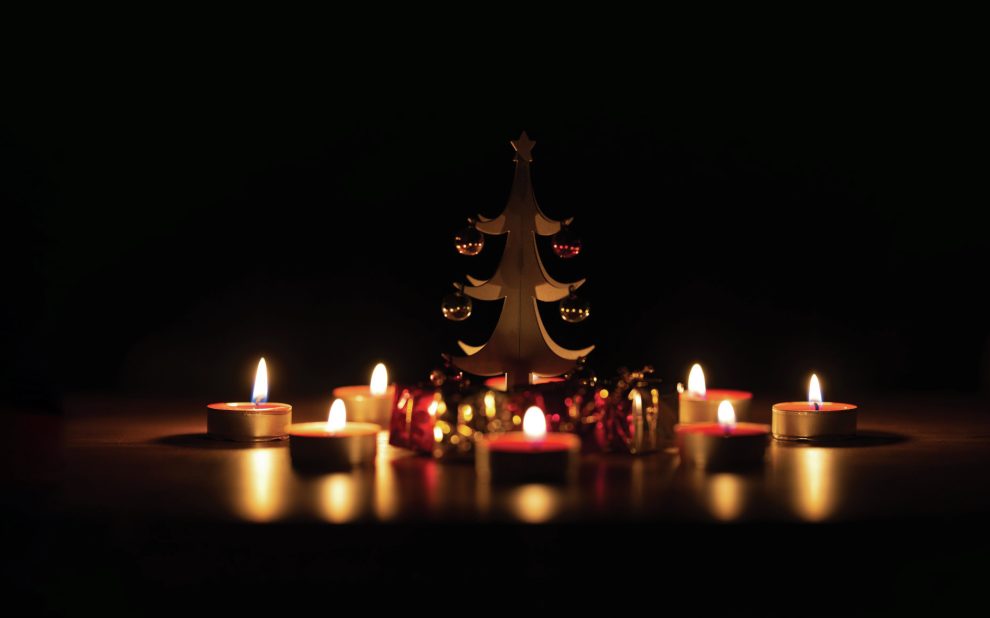

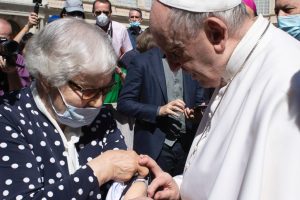

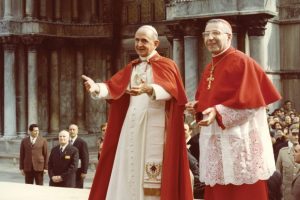






Add comment